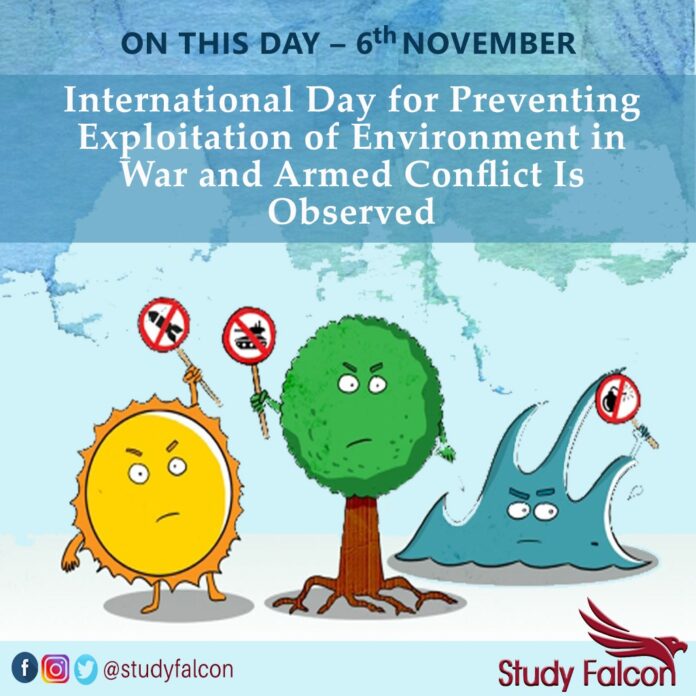The International Day for Preventing the Exploitation of the Environment in War and Armed Conflict is observed annually on November 6 to raise awareness about the environmental damage caused due to wars.
Though humanity has always counted its war casualties in terms of dead and wounded soldiers and civilians, destroyed cities and livelihoods, the environment has often remained the unpublicized victim of war. Water wells have been polluted, crops torched, forests cut down, soils poisoned, and animals killed to gain military advantage.
The six agencies of United Nations namely United Nations Environment Programme, United Nations Development Programme, UNHABITAT, Department of Political Affairs, United Nations Department of Economic and Social Affairs (DESA) and Peace Building Support Office (PBSO) have partnered with the European Union to help countries prevent tensions arising due to natural resources. This is a part of peacebuilding programmes of the United Nations and its conflict prevention measures.
Furthermore, the United Nations Environment Programme (UNEP) has found that over the last 60 years, at least 40 percent of all internal conflicts have been linked to the exploitation of natural resources, whether high-value resources such as timber, diamonds, gold and oil, or scarce resources such as fertile land and water. Conflicts involving natural resources have also been found to be twice as likely to relapse.
The United Nations attaches great importance to ensuring that action on the environment is part of conflict prevention, peacekeeping and peace-building strategies, because there can be no durable peace if the natural resources that sustain livelihoods and ecosystems are destroyed.
On 5 November 2001, the UN General Assembly declared 6 November of each year as the International Day for Preventing the Exploitation of the Environment in War and Armed Conflict.
On 27 May 2016, the United Nations Environment Assembly adopted resolution UNEP/EA.2/Res.15, which recognized the role of healthy ecosystems and sustainably managed resources in reducing the risk of armed conflict, and reaffirmed its strong commitment to the full implementation of the Sustainable Development Goals listed in General Assembly resolution 70/1, entitled “Transforming our world: the 2030 Agenda for Sustainable Development”.
The United Nations Environment Programme along with the Environmental Law Institute and Universities of Tokyo and McGill have initiated the Global Research Programme to adapt good practices on managing natural resources in the post-conflict peacebuilding period.
In 2007, the conflict in Sudan Darfur region was declared the first Climate Change Conflict. The changes in rainfall patterns resulted in water scarcity in the region that in turn contributed to the conflict. According to the United Nations 1% increase in global temperature leads to 4.5% of civil war.
In any armed conflict, it is the human cost that is counted first in terms of dead and wounded. However, the impact of war on the environment is always ignored. During any war, crops are burned, water wells are polluted, forest cut down and animals killed to achieve military advantage against the rivals. The warring armies care little about the impact of wars on the future.
According to the United Nations Environment Programme (UNEP), at least 40 percent of all internal conflicts were linked to the exploitation of natural resources over the last 60 years. Hence to minimise the impacts of wars and armed conflicts on the environment, the United Nations General Assembly in 2001 declared November 6 as the International Day for Preventing the Exploitation of the Environment in War and Armed Conflict. The assembly considered that that any environmental damage in times of armed conflict impairs ecosystems and natural resources long after the period of conflict. This damage can often extend beyond the limits of national territories and today’s generation. The assembly also recalled










